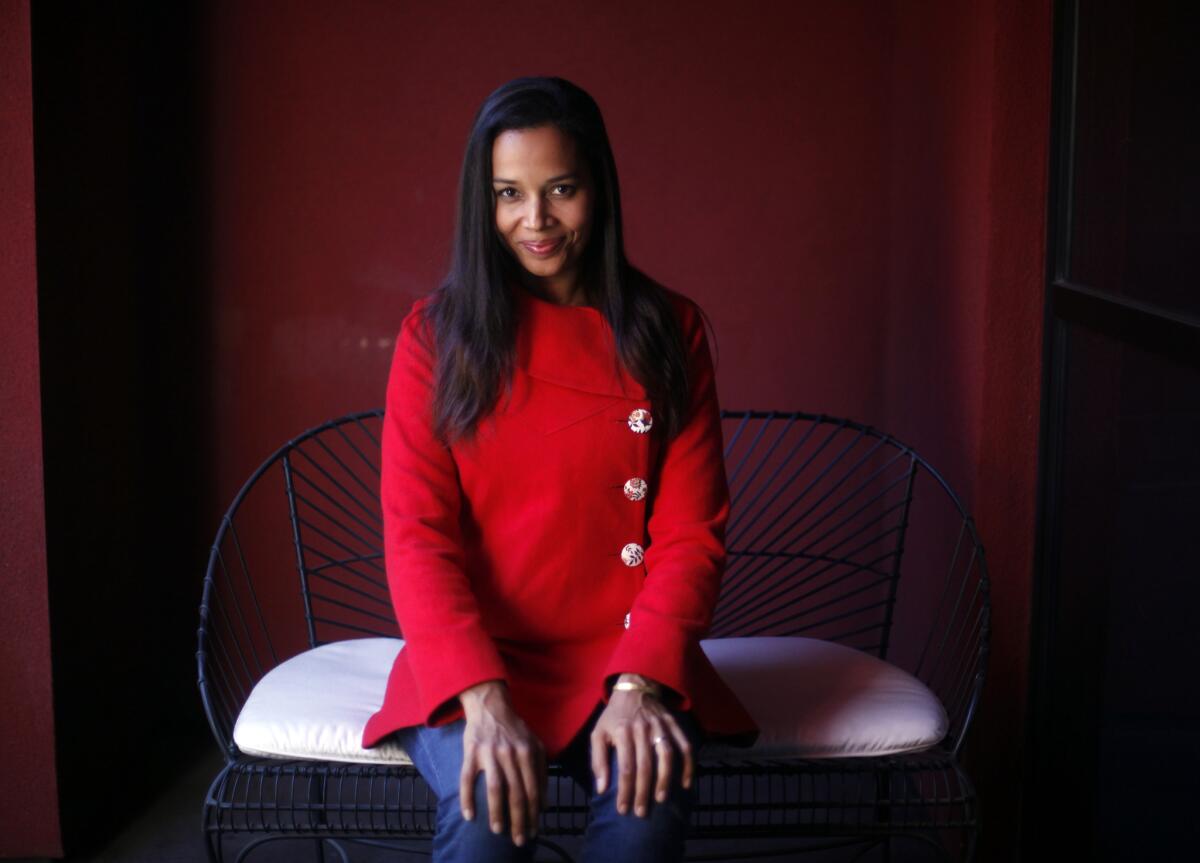Rhiannon Giddens discovers true calling with help from friends

- Share via
What a difference a year makes.
Toward the end of 2013, singer-fiddler Rhiannon Giddens and her band, the Carolina Chocolate Drops, were at a crossroads. One of the group’s original members, Dom Flemons, had decided to pursue a solo career, leaving Giddens and multi-instrumentalist Hubby Jenkins to find a replacement if the Durham, N.C.-based group were to continue.
From that state of career limbo, Giddens caught the attention of such respected musicians as T Bone Burnett and Elvis Costello, scored a co-writing credit with no less than Bob Dylan, and is about to release her debut solo album, a collection that should solidify her status as one of the bright new lights in pop music.
As a founding member of the Chocolate Drops, which released its first album in 2006, Giddens and her bandmates set out to rediscover African American folk music of the 19th and 20th centuries and bring those songs to contemporary audiences. They won a Grammy for their 2010 album, “Genuine Negro Jig.”
After Flemons announced his decision to depart, Giddens got a call to sing at a big folk-music event in New York.
As it happened, the ringmaster was superstar Americana producer-musician Burnett, who was putting on a concert spotlighting music from Ethan and Joel Coen’s latest movie, “Inside Llewyn Davis,” about a Dylan-like young folk singer set in the early 1960s.
Given her background, Giddens was a natural for the “Another Day, Another Time” concert, although far less known than others in the lineup: folk music matriarch Joan Baez and punk priestess Patti Smith, along with Jack White, Marcus Mumford, Gillian Welch, the Punch Brothers and several others, including “Llewyn Davis” star Oscar Isaac.
“I thought, ‘What am I doing here with all these people?’” Giddens said on a recent stop in Los Angeles. “I decided that what I could bring was something out of the tradition I’ve been working in.”
She sang “Waterboy,” a Jacques Wolfe song that folk great Odetta recorded in the 1960s, and then offered a traditional a cappella Gaelic song in a performance that by all accounts was jaw-dropping.
“When she did that,” said another leading Americana producer-musician, Joe Henry, “she brought the house down.”
Burnett likened her performance to what he felt seeing Elton John’s U.S. career-making debut at the Troubadour in West Hollywood in 1970. “It was clear the first time I heard her at rehearsal,” he said, “that Rhiannon is next in a long line of singers that include Marian Anderson, Odetta, Mahalia Jackson, Rosetta Tharpe. We need that person in our culture.”
Since that gig — shown last winter on Showtime and slated for release this month as a live album and concert film — Giddens’ star has continued to rise. Burnett subsequently invited her to be part of an ad hoc band charged with coming up with music for a few dozen sets of lyrics that Dylan had written in 1967 and then shelved for 47 years, making Giddens only the third woman to co-write with him. Her bandmates for the album “Lost on the River: The New Basement Tapes”: Costello, Mumford, My Morning Jacket’s Jim James and Dawes’ Taylor Goldsmith.
Last year, Henry tapped Giddens to record “The Wexford Carols,” an album of long-lost 17th and 18th century Irish Christmas carols reconstructed by singer Caitríona O’Leary and released in November. More recently, Apple used her voice — singing George and Ira Gershwin’s “Our Love Is Here to Stay” — in a feel-good holiday commercial, and there’s more exposure, still unannounced, planned in the new year.
She’s releasing her debut solo album, “Tomorrow Is My Turn,” on Feb. 10, and she’ll embark on her first solo tour in April, backed by the revamped and expanded Chocolate Drops.
In a dozen songs on her album, she salutes music from various female predecessors, including gospel singer-guitarist Tharpe, country queens Patsy Cline and Dolly Parton and folk-blues musician Elizabeth Cotten. It concludes with one original, “Angel City,” a meditation that grew out of her experience working with the New Basement Tapes band. Its theme? Someone who’d felt lost, then discovered her true calling — with a little help from her friends.
The title track was previously recorded by another of the many female musicians Giddens admires— Nina Simone. By conjuring all these famed, influential voices, the album underscores the point that Giddens is ready to take her place alongside them.
Twitter: @RandyLewis2
More to Read
The biggest entertainment stories
Get our big stories about Hollywood, film, television, music, arts, culture and more right in your inbox as soon as they publish.
You may occasionally receive promotional content from the Los Angeles Times.











